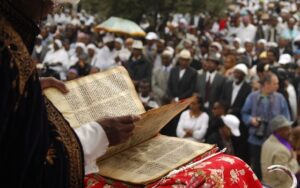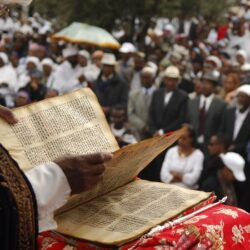Sigd is an Amharic word meaning “prostration” or “worship” and is the commonly used name for a holiday celebrated by the Ethiopian Jewish Beta Israel community on the 29th of the Hebrew month of Marḥeshvan. This date is exactly 50 days after Yom Kippur, usually falling out in late October or November, and according to Ethiopian Jewish tradition is also the date that God first revealed himself to Moses.[1] Jewish Virtual Library, “Ethiopian Jewry: Sigd Holiday“
Sigd is a unique holiday. Originally only celebrated by the Ethiopian Jewish Beta Esrael community, it has gotten more traction recently. One could describe the key concept of Sigd as being the acceptance of the Torah — not the giving, but the receiving of it. Sigd is a holiday of the continuation of the covenant. No matter the persecution that the Beta Esrael suffered (and hoo boy, did they suffer), Sigd announced that they would preserve their Judaism through it all.
In the morning of Sigd, the community goes out to a mountain with the sacred Orit (the Pentateuch, Joshua, Judges, and Ruth) and recites prayers, after which several texts from the Orit and elsewhere in the Gəʿəz Bible are read. The four readings here include:
- the giving of the Torah at Mt. Sinai (Exodus 19-20),
- the rededication ceremony described in Neḥemiah 9 and considered to be the source for the majority the holiday’s observances,
- the blessings and curses of the mountains (Deuteronomy 27),
- and Psalms 122.[2] Nota bene: in the Masoretic text used by most of the world’s Jews, this psalm is numbered Psalm 122. The Ethiopian Gəʿəz text for Psalms uses a different enumeration system, in which it is Psalm 121. In context this psalm is generally not read as part of the Biblical reading service, but rather as a part of the prayers preceding it, specifically, surrounding the text of Menabērtē Bēytē Dawid. The first verses are read, then the full text of Menabērtē Bēytē Dawid (which includes the verse ‘Jerusalem, built up like a city knit together’ within it) is inserted, followed by the rest of the psalm read at the end.
This is largely based on the work of Shoshana ben-Dor (former director of the North American Conference on Ethiopian Jewry), and translated into English by Isaac Mayer.
This is part two of a series of Sigd readings in English, Hebrew, and Ge’ez transliteration that the editor will be posting here.
| Masoretic text (Hebrew) | Masoretic translation (English) | LXX translation (romanized Ge’ez) |
|---|---|---|
וַיְצַ֤ו מֹשֶׁה֙ וְזִקְנֵ֣י יִשְׂרָאֵ֔ל אֶת־הָעָ֖ם לֵאמֹ֑ר שָׁמֹר֙ אֶת־כׇּל־הַמִּצְוָ֔ה אֲשֶׁ֧ר אָנֹכִ֛י מְצַוֶּ֥ה אֶתְכֶ֖ם הַיּֽוֹם׃ |
And Moses and the elders of Israel commanded the people and said: Guard every commandment that I command you today. |
Wäʾäzäzomu Muse läʾäʾərugä ʾƎsəraʾelə wäyəbelomu ʽäḳu kämä təgəbäru kʷəlo zänətä təʾəzazä kʷəlo zäʾänä ʾəʾezəzäkä yomə. |
וְהָיָ֗ה בַּיּוֹם֮ אֲשֶׁ֣ר תַּעַבְר֣וּ אֶת־הַיַּרְדֵּן֒ אֶל־הָאָ֕רֶץ אֲשֶׁר־יְהֹוָ֥ה אֱלֹהֶ֖יךָ נֹתֵ֣ן לָ֑ךְ וַהֲקֵמֹתָ֤ לְךָ֙ אֲבָנִ֣ים גְּדֹל֔וֹת וְשַׂדְתָּ֥ אֹתָ֖ם בַּשִּֽׂיד׃ |
And it will be, on the day when you cross the Jordan to the land that the Lord your God is giving you, you will set up great stones and plaster them with plaster. |
Wäʾämä täʽädəwəwo läYorədanəsə wəsətä mədərə ʾənətä yəhubäkəmu ʾƎgəziʾäbəḥerə ʾäməlakəkəmu wätaḳäwəmə läkä ʾəbənä ʽäbäyətä wätəmärəgo märetä ṣäʽäda. |
וְכָתַבְתָּ֣ עֲלֵיהֶ֗ן אֶֽת־כׇּל־דִּבְרֵ֛י הַתּוֹרָ֥ה הַזֹּ֖את בְּעׇבְרֶ֑ךָ לְמַ֡עַן אֲשֶׁר֩ תָּבֹ֨א אֶל־הָאָ֜רֶץ אֲֽשֶׁר־יְהֹוָ֥ה אֱלֹהֶ֣יךָ ׀ נֹתֵ֣ן לְךָ֗ אֶ֣רֶץ זָבַ֤ת חָלָב֙ וּדְבַ֔שׁ כַּאֲשֶׁ֥ר דִּבֶּ֛ר יְהֹוָ֥ה אֱלֹהֵֽי־אֲבֹתֶ֖יךָ לָֽךְ׃ |
And you will write on them all the words of this Teaching when you cross so that you come into the land that the Lord your God is giving you, a land flowing with milk and honey, as the Lord God of your ancestors said to you. |
Wätəṣəḥəfə wəsətä wəʾətonə ʾəbänə kʷəlo nägäro läzənətu ḥəgə ʽädiwäkəmu yorədanəsə sobä boʾəkəmu wəsətä yəʾəti mədərə ʾənətä yəhubäkəmu ʾƎgəziʾäbəḥerə ʾäməlakomu läʾäbäwinä kämä yähäbəkä mədərä ʾənətä təwəḥəzə ḥälibä wämäʽarä bäkämä yəbeläkä ʾƎgəziʾäbəḥerə ʾäməlakomu läʾäbäwikä. |
וְהָיָה֮ בְּעׇבְרְכֶ֣ם אֶת־הַיַּרְדֵּן֒ תָּקִ֜ימוּ אֶת־הָאֲבָנִ֣ים הָאֵ֗לֶּה אֲשֶׁ֨ר אָנֹכִ֜י מְצַוֶּ֥ה אֶתְכֶ֛ם הַיּ֖וֹם בְּהַ֣ר עֵיבָ֑ל וְשַׂדְתָּ֥ אוֹתָ֖ם בַּשִּֽׂיד׃ |
And it will be, upon your crossing the Jordan, you will put up these stones that I command you today on Mount Ebal and plaster them with plaster. |
Wäsobä ʽädäwəkəmu Yorədanəsə taḳäwəməwonə läwəʾətonə ʾəbänə ʾəlä ʾänä ʾəʾezəzäkəmu yomə bäʾənətiʾähonə wəsətä däbərä gebalə wotəmärəgəwonə märetä ṣäʽäda. |
וּבָנִ֤יתָ שָּׁם֙ מִזְבֵּ֔חַ לַיהֹוָ֖ה אֱלֹהֶ֑יךָ מִזְבַּ֣ח אֲבָנִ֔ים לֹא־תָנִ֥יף עֲלֵיהֶ֖ם בַּרְזֶֽל׃ |
And you will build there an altar to the Lord your God, a stone altar – you will not wield iron over them. |
Wätənädəḳə bähəyä məśəwaʽä läʾƎgəziʾäbəḥerə ʾäməlakəkä bäʾəbänə wäʾiyəgəsəsonə ḥäṣ́inə. |
אֲבָנִ֤ים שְׁלֵמוֹת֙ תִּבְנֶ֔ה אֶת־מִזְבַּ֖ח יְהֹוָ֣ה אֱלֹהֶ֑יךָ וְהַעֲלִ֤יתָ עָלָיו֙ עוֹלֹ֔ת לַיהֹוָ֖ה אֱלֹהֶֽיךָ׃ |
Of whole stones you will build the altar of the Lord your God, and you will offer upon it whole-offerings to the Lord your God. |
Bäʾəbänə ʾəlä ʾikona wəḳuratä bonətu tənädəḳə məśəwaʽä läʾƎgəziʾäbəḥerə ʾäməlakəkä. |
וְזָבַחְתָּ֥ שְׁלָמִ֖ים וְאָכַ֣לְתָּ שָּׁ֑ם וְשָׂ֣מַחְתָּ֔ לִפְנֵ֖י יְהֹוָ֥ה אֱלֹהֶֽיךָ׃ |
And you will sacrifice peace-offerings and eat there, and rejoice before the Lord your God. |
Wätəśäwəʽə läʽəlehonə mäśəwaʽətä mädäḫänitə wäbəlaʽə wäṣəgäbə bähəyä wätäfäśaḥə bäḳədəmä ʾƎgəziʾäbəḥerə ʾäməlakəkä. |
וְכָתַבְתָּ֣ עַל־הָאֲבָנִ֗ים אֶֽת־כׇּל־דִּבְרֵ֛י הַתּוֹרָ֥ה הַזֹּ֖את בַּאֵ֥ר הֵיטֵֽב׃ |
And you will write on the stones all the words of this teaching — exceedingly clearly. |
Wäṣäḥäfə wəsətä wəʾətonə ʾəbänə kʷəlo zänətä ḥəgä ṭəyuḳä ṭəḳä. |
וַיְדַבֵּ֤ר מֹשֶׁה֙ וְהַכֹּהֲנִ֣ים הַלְוִיִּ֔ם אֶ֥ל כׇּל־יִשְׂרָאֵ֖ל לֵאמֹ֑ר הַסְכֵּ֤ת ׀ וּשְׁמַע֙ יִשְׂרָאֵ֔ל הַיּ֤וֹם הַזֶּה֙ נִהְיֵ֣יתָֽ לְעָ֔ם לַיהֹוָ֖ה אֱלֹהֶֽיךָ׃ |
And Moses and the priests and Levites spoke to all Israel to say: Shush! Listen, Israel, today you have become the people of the Lord your God. |
Wäyəbeləwomu Muse wäkahənatə lälewawəyanə wäläkʷəlu ʾƎsəraʾelə ʾärəməmə wäsəmaʽə ʾƎsəraʾelə bäzati ʽəlätə konəkä ḥəzəbo läʾƎgəziʾäbəḥerə ʾäməlakəkä. |
וְשָׁ֣מַעְתָּ֔ בְּק֖וֹל יְהֹוָ֣ה אֱלֹהֶ֑יךָ וְעָשִׂ֤יתָ אֶת־מִצְוֺתָו֙ וְאֶת־חֻקָּ֔יו אֲשֶׁ֛ר אָנֹכִ֥י מְצַוְּךָ֖ הַיּֽוֹם׃ |
And listen to the voice of the Lord your God and do God’s commandments and laws that I command you. |
Wäsəmaʽə ḳalä ʾƎgəziʾäbəḥerə ʾäməlakəkä wägəbärə kʷəlo təʾəzazo wäkʷənänehu zäʾänä ʾəʾezəzäkä yomə. |
וַיְצַ֤ו מֹשֶׁה֙ אֶת־הָעָ֔ם בַּיּ֥וֹם הַה֖וּא לֵאמֹֽר׃ |
And Moses commanded the people on that day and said: |
Wäʾäzäzomu Muse läḥəzəbə bäyəʾəti ʽəlätə wäyəbelomu: |
אֵ֠לֶּה יַֽעַמְד֞וּ לְבָרֵ֤ךְ אֶת־הָעָם֙ עַל־הַ֣ר גְּרִזִ֔ים בְּעׇבְרְכֶ֖ם אֶת־הַיַּרְדֵּ֑ן שִׁמְעוֹן֙ וְלֵוִ֣י וִֽיהוּדָ֔ה וְיִשָּׂשכָ֖ר וְיוֹסֵ֥ף וּבִנְיָמִֽן׃ |
These will stand to bless the people on Mount Gerizim upon your crossing the Jordan: Simeon and Levi and Judah and Issachar and Joseph and Benjamin. |
ʾƎlu ʾəmunətu ʾəlä yəḳäwəmu wäyəbarəkəwo läḥəzəbə bädäbərä Garizənə ʽädiwäkəmu Yorədanəsə: Səməʽonə wäLewi wäYəhuda wäYəsakarə wäYosefə wäBənəyamə. |
וְאֵ֛לֶּה יַֽעַמְד֥וּ עַל־הַקְּלָלָ֖ה בְּהַ֣ר עֵיבָ֑ל רְאוּבֵן֙ גָּ֣ד וְאָשֵׁ֔ר וּזְבוּלֻ֖ן דָּ֥ן וְנַפְתָּלִֽי׃ |
And these will stand for the curse on Mt. Ebal: Reuben, Gad and Asher and Zebulun and Dan and Naftali. |
Wäʾəlu ʾəmunətu ʾəlä yəḳäwəmu lärägimə bädäbərä Gebalə: Robenə wäGadə wäʾÄserə wäZabulonə wäDanə wäNəfətalemə. |
וְעָנ֣וּ הַלְוִיִּ֗ם וְאָ֥מְר֛וּ אֶל־כׇּל־אִ֥ישׁ יִשְׂרָאֵ֖ל ק֥וֹל רָֽם׃ |
And the Levites will answer and say to every Israelite in a loud voice: |
Wäyawäśəʾu läʾihomu lewawəyanə wäyəbələwomu läkʷəlu ʾƎsəraʾelə bäḳalə ʽäbiyə: |
אָר֣וּר הָאִ֡ישׁ אֲשֶׁ֣ר יַעֲשֶׂה֩ פֶ֨סֶל וּמַסֵּכָ֜ה תּוֹעֲבַ֣ת יְהֹוָ֗ה מַעֲשֵׂ֛ה יְדֵ֥י חָרָ֖שׁ וְשָׂ֣ם בַּסָּ֑תֶר וְעָנ֧וּ כׇל־הָעָ֛ם וְאָמְר֖וּ אָמֵֽן׃ |
Cursed be one who makes a sculpture or molten image abominable to the Lord, the work of a crafter’s hands, and places it in secret! And the people will answer and say amen. |
Rəgumä läyəkunə bəʾəsi zäyəgäbərə gələfo wäsəbəko zärəkusə bäḫäbä ʾƎgəziʾäbəḥerə gəbərä kenəya wäyəśäyəmə wäyäḫäbəʾə — wäyawäśəʾə kʷəlu ḥəzəbə wäyəbələ ʾämenə wäʾämenə. |
אָר֕וּר מַקְלֶ֥ה אָבִ֖יו וְאִמּ֑וֹ וְאָמַ֥ר כׇּל־הָעָ֖ם אָמֵֽן׃ |
Cursed be the one who curses their father and mother! And the people will say amen. |
Rəgumä läyəkunə zäyasətäʾäki ʾäbahu wäʾəmo — wäyəbələ kʷəlu ḥəzəbə ʾemenə wäʾämenə. |
אָר֕וּר מַסִּ֖יג גְּב֣וּל רֵעֵ֑הוּ וְאָמַ֥ר כׇּל־הָעָ֖ם אָמֵֽן׃ |
Cursed be the one who moves their neighbor’s border post! And the people will say amen. |
Rəgumä läyəkunə zäyəsärəḳə däwälä biṣu — wäyəbələ kʷəlu ḥəzəbə ʾämenə wäʾämenə. |
אָר֕וּר מַשְׁגֶּ֥ה עִוֵּ֖ר בַּדָּ֑רֶךְ וְאָמַ֥ר כׇּל־הָעָ֖ם אָמֵֽן׃ |
Cursed be the one who misleads the blind on their path! And the people will say amen. |
Rəgumä läyəkunə zäyasəḥəto fənotə läʽəwərə — wäyəbələ kʷəlu ḥəzəbə ʾämenə wäʾämenə. |
אָר֗וּר מַטֶּ֛ה מִשְׁפַּ֥ט גֵּר־יָת֖וֹם וְאַלְמָנָ֑ה וְאָמַ֥ר כׇּל־הָעָ֖ם אָמֵֽן׃ |
Cursed be the one who perverts the law of the immigrant, foreigner and widow! And the people will say amen. |
Rəgumä läyəkunə zäyəgäməṣ́ə fətəḥä gəyurə wäzäʾəgwalä mawəta wäzäʾəberə — wäyəbələ kʷəlu ḥəzəbə ʾämenə wäʾämenə. |
אָר֗וּר שֹׁכֵב֙ עִם־אֵ֣שֶׁת אָבִ֔יו כִּ֥י גִלָּ֖ה כְּנַ֣ף אָבִ֑יו וְאָמַ֥ר כׇּל־הָעָ֖ם אָמֵֽן׃ |
Cursed be the one who sleeps with their parent’s spouse, for they have removed their parent’s clothing! And the people will say amen. |
Rəgumä läyəkunə zäyəsäkəbə məsəlä bəʾəsitä ʾäbuhu ʾəsəmä käśätä ḫäfərätä ʾäbuhu — wäyəbələ kʷəlu ḥəzəbä ʾämenə wäʾämenə. |
אָר֕וּר שֹׁכֵ֖ב עִם־כׇּל־בְּהֵמָ֑ה וְאָמַ֥ר כׇּל־הָעָ֖ם אָמֵֽן׃ |
Cursed be the one who sleeps with any animal! And the people will say amen. |
Rəgumä läyəkunə zäyəsäkəbə məsəlä kʷəlu ʾənəsəsa — wäyəbələ kʷəlu ḥəzəbə ʾämenə wäʾämenə. |
אָר֗וּר שֹׁכֵב֙ עִם־אֲחֹת֔וֹ בַּת־אָבִ֖יו א֣וֹ בַת־אִמּ֑וֹ וְאָמַ֥ר כׇּל־הָעָ֖ם אָמֵֽן׃ |
Cursed be the one who sleeps with their sibling — their father’s child or mother’s child! And the people will say amen. |
Rəgumä läyəkunə zäyəsäkəbə məsəlä ʾəḫətu ʾəmäni ʾənətä ʾəməʾäbuhu wäʾəmäni ʾənətä ʾəməʾəmu — wäyəbələ kʷəlu ḥəzəbə ʾämenə wäʾämenə. |
אָר֕וּר שֹׁכֵ֖ב עִם־חֹֽתַנְתּ֑וֹ וְאָמַ֥ר כׇּל־הָעָ֖ם אָמֵֽן׃ |
Cursed be the one who sleeps with their in-laws! And the people will say amen. |
Rəgumä läyəkunə zäyəsäkəbə məsəlä ʾəmä bəʾəsitu — wäyəbələ kʷəlu ḥəzəbə ʾämenə wäʾämenə. |
אָר֕וּר מַכֵּ֥ה רֵעֵ֖הוּ בַּסָּ֑תֶר וְאָמַ֥ר כׇּל־הָעָ֖ם אָמֵֽן׃ |
Cursed be the one who strikes a comrade in secret! And the people will say amen. |
Rəgumä läyəkunə zäyəzäbəṭə kaləʾo bägʷəḥəlutə — wäyəbələ kʷəlu ḥəzəbə ʾämenə wäʾämenə. |
אָרוּר֙ לֹקֵ֣חַ שֹׁ֔חַד לְהַכּ֥וֹת נֶ֖פֶשׁ דָּ֣ם נָקִ֑י וְאָמַ֥ר כׇּל־הָעָ֖ם אָמֵֽן׃ |
Cursed be the one who takes a bribe regarding the taking of innocent blood! And the people will say amen. |
Rəgumä läyəkunə zäyənäśəʾə ḥələyanä kämä yəḳətələ näfəsä dämä nəṣuḥä —wäyəbələ kʷəlu ḥəzəbə ʾämenə wäʾämenə. |
אָר֗וּר אֲשֶׁ֧ר לֹא־יָקִ֛ים אֶת־דִּבְרֵ֥י הַתּוֹרָֽה־הַזֹּ֖את לַעֲשׂ֣וֹת אוֹתָ֑ם וְאָמַ֥ר כׇּל־הָעָ֖ם אָמֵֽן׃ |
Cursed be the one who does not fulfill the words of this Teaching to do them! And the people will say amen. |
Rəgumä läyəkunə kʷəlu bəʾəsi zäʾiyəḳäwəmə yəgəbärə ḳalä zäwəsətä zənətu ḥəgə — wäyəbələ kʷəlu ḥəzəbə ʾämenə wäʾämenə. |
Notes
| 1 | Jewish Virtual Library, “Ethiopian Jewry: Sigd Holiday“ |
|---|---|
| 2 | Nota bene: in the Masoretic text used by most of the world’s Jews, this psalm is numbered Psalm 122. The Ethiopian Gəʿəz text for Psalms uses a different enumeration system, in which it is Psalm 121. In context this psalm is generally not read as part of the Biblical reading service, but rather as a part of the prayers preceding it, specifically, surrounding the text of Menabērtē Bēytē Dawid. The first verses are read, then the full text of Menabērtē Bēytē Dawid (which includes the verse ‘Jerusalem, built up like a city knit together’ within it) is inserted, followed by the rest of the psalm read at the end. |

“📜 דברים כ״ז | Blessings and Curses on the Mountains (Deuteronomy 27): the third reading for the Sigd festival” is shared through the Open Siddur Project with a Creative Commons Attribution-ShareAlike 4.0 International copyleft license.





Leave a Reply